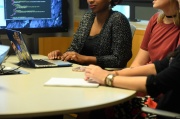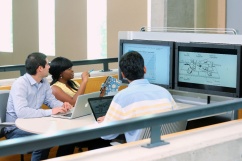Our Stories
New partnership opens doors to postâsecondary computer science education

A new partnership between Dalhousie and the Nova Scotia Department of Education and Early Childhood Development (EECD) opens doors for high school students from across the province to explore computer science and post-secondary education options.
This week, 50 grade 12 students from across the province will begin an online course through the Nova Scotia Virtual School that not only teaches them the foundations of computer science but will also give them an optional credit towards the first-year course, CSCI 1105 Introduction to Computer Programming, which is a core first year course in the Faculty of Computer Science.
This pilot dual-credential opportunity is a collaboration between EECD, the Faculty of Computer Science and the College of Continuing Education and builds on the existing high school-level Computer Programming 12 course. Read more
How a community of practice is empowering computer science faculty

As the fall term moves into high gear, academic units around Dalhousie are adapting to the new reality of online teaching. For the Faculty of Computer Science (FCS), that shift has been made easier by a teaching development approach known as the community of practice, an organic movement based on relationship building and peer support. By sharing teaching experiences â and even attending each otherâs classes â faculty members in the FCS are gaining moral support and expanding their pedagogical horizons. Other faculties at Dalhousie are also enjoying success with this approach.
The architect of this movement in the FCS is educational developer Stephanie Bernier. Bernier was hired last August and brings a wealth of experience in online pedagogy to Dalhousie, having spent the previous 20 years directing digital learning and ICT programs at colleges in Dubai.
âThe community of practice philosophy that is happening at the Faculty of Computer Science is basically an extension of what we started in the last academic year when faculty were teaching face-to-face classes,â she says. Read more

